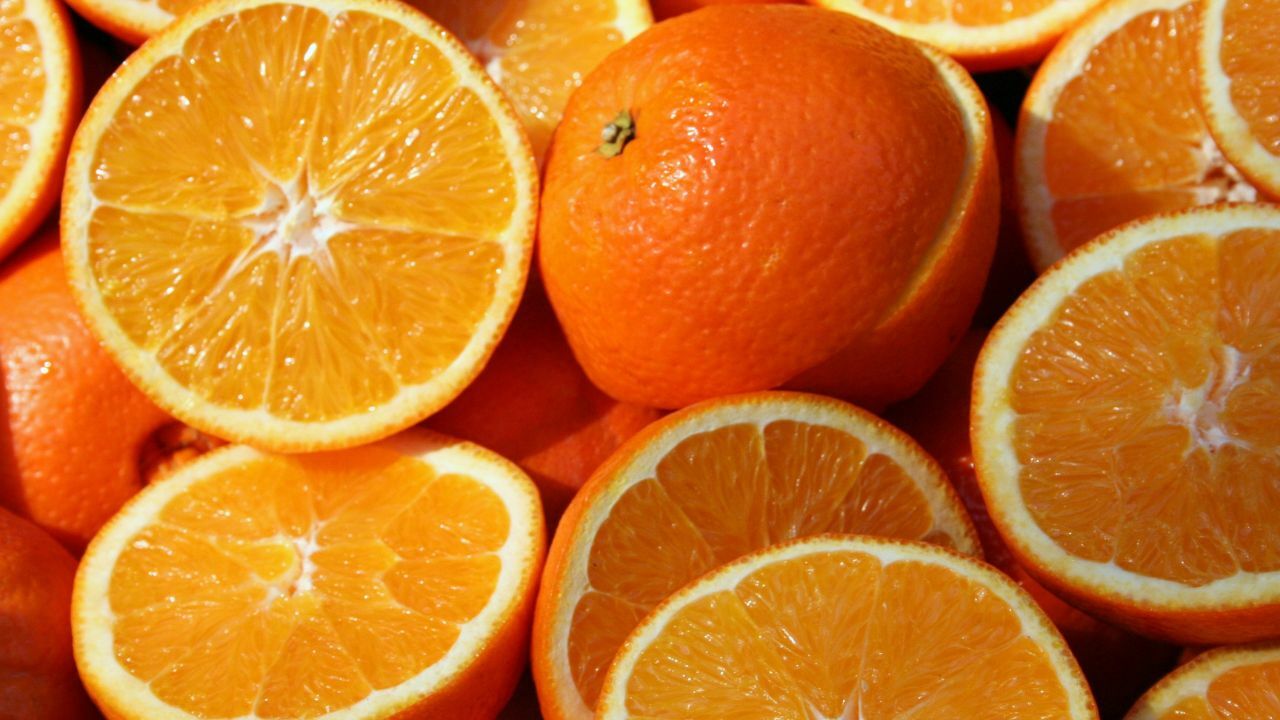I. Introduction
Oranges have been a part of Kenyan culture for centuries, with references to the fruit dating back to the 10th century. Oranges were originally brought to Kenya by Portuguese traders, who introduced the citrus fruit to the coastal regions of the country. Since then, oranges have become an integral part of Kenyan cuisine, culture, and economy.
Kenyan oranges are renowned for their juicy, sweet flavor and vibrant color. They are a popular ingredient in many traditional Kenyan dishes, such as muthokoi (maize and beans) and githeri (a mix of maize and beans), as well as in juices and jams. In addition to their delicious taste, Kenyan oranges are packed with essential nutrients that offer a range of health benefits.
Oranges are a rich source of vitamin C, an essential nutrient that plays a crucial role in immune system function. A single orange provides over 100% of the daily recommended intake of vitamin C, making it a great way to boost your immune system and fight off infections. Oranges also contain folate, which is important for fetal development during pregnancy, and potassium, which supports healthy blood pressure levels.
Beyond these essential nutrients, oranges also contain a range of powerful antioxidants that protect the body against inflammation and chronic diseases. The flavonoids found in oranges, such as hesperidin and naringenin, have been shown to reduce inflammation in the body and improve cardiovascular health. Additionally, oranges are a great source of fiber, which supports healthy digestion and can help to reduce cholesterol levels.
Kenyan oranges are not only a delicious and versatile ingredient in Kenyan cuisine but also a valuable source of essential nutrients that support immune system function, promote healthy skin, and reduce the risk of chronic diseases. In the following sections, we will explore the farming locations for Kenyan oranges, international markets, and the future of orange farming in Kenya.
Oranges have been a part of Kenyan culture for centuries, with references to the fruit dating back to the 10th century. Oranges were originally brought to Kenya by Portuguese traders, who introduced the citrus fruit to the coastal regions of the country. Since then, oranges have become an integral part of Kenyan cuisine, culture, and economy.
Kenyan oranges are renowned for their juicy, sweet flavor and vibrant color. They are a popular ingredient in many traditional Kenyan dishes, such as muthokoi (maize and beans) and githeri (a mix of maize and beans), as well as in juices and jams. In addition to their delicious taste, Kenyan oranges are packed with essential nutrients that offer a range of health benefits.
Oranges are a rich source of vitamin C, an essential nutrient that plays a crucial role in immune system function. A single orange provides over 100% of the daily recommended intake of vitamin C, making it a great way to boost your immune system and fight off infections. Oranges also contain folate, which is important for fetal development during pregnancy, and potassium, which supports healthy blood pressure levels.
Beyond these essential nutrients, oranges also contain a range of powerful antioxidants that protect the body against inflammation and chronic diseases. The flavonoids found in oranges, such as hesperidin and naringenin, have been shown to reduce inflammation in the body and improve cardiovascular health. Additionally, oranges are a great source of fiber, which supports healthy digestion and can help to reduce cholesterol levels.
Kenyan oranges are not only a delicious and versatile ingredient in Kenyan cuisine but also a valuable source of essential nutrients that support immune system function, promote healthy skin, and reduce the risk of chronic diseases. In the following sections, we will explore the farming locations for Kenyan oranges, international markets, and the future of orange farming in Kenya.

II. Health Benefits of Kenyan Oranges
Kenyan oranges are a powerhouse of nutrients, offering a range of health benefits that make them a valuable addition to any diet. Let's take a closer look at some of the key health benefits of Kenyan oranges:
1. Rich in Vitamin C: Kenyan oranges are an excellent source of vitamin C, a powerful antioxidant that plays a vital role in immune system function. Vitamin C helps to protect cells from damage caused by free radicals, supports healthy skin, and aids in the absorption of iron. A single medium-sized orange provides over 100% of the daily recommended intake of vitamin C.
2. Boosts Immune System: In addition to vitamin C, Kenyan oranges also contain other essential nutrients such as folate and potassium, which are crucial for immune system function. The high antioxidant content in oranges helps to boost the immune system, reducing the risk of infections such as the common cold.
3. Anti-Inflammatory Properties: Oranges are rich in flavonoids such as hesperidin and naringenin, which have been shown to have anti-inflammatory properties. These flavonoids help to reduce inflammation in the body, improving overall health and wellness.
4. Protection Against Chronic Diseases: The antioxidants found in Kenyan oranges, including vitamin C and flavonoids, can help to reduce the risk of chronic diseases such as heart disease and cancer. These antioxidants protect cells from damage caused by free radicals, reducing the risk of chronic diseases and promoting overall health.
5. Benefits for Skin Health: The high vitamin C content in Kenyan oranges also promotes healthy skin. Vitamin C is necessary for collagen production, which helps to keep skin looking youthful and vibrant. Additionally, the antioxidants in oranges help to protect the skin from damage caused by UV rays and environmental pollutants.
Kenyan oranges are packed with essential nutrients and antioxidants that support immune system function, promote healthy skin, and reduce the risk of chronic diseases. Incorporating oranges into your diet is an easy and delicious way to improve your overall health and wellness.
Kenyan oranges are a powerhouse of nutrients, offering a range of health benefits that make them a valuable addition to any diet. Let's take a closer look at some of the key health benefits of Kenyan oranges:
1. Rich in Vitamin C: Kenyan oranges are an excellent source of vitamin C, a powerful antioxidant that plays a vital role in immune system function. Vitamin C helps to protect cells from damage caused by free radicals, supports healthy skin, and aids in the absorption of iron. A single medium-sized orange provides over 100% of the daily recommended intake of vitamin C.
2. Boosts Immune System: In addition to vitamin C, Kenyan oranges also contain other essential nutrients such as folate and potassium, which are crucial for immune system function. The high antioxidant content in oranges helps to boost the immune system, reducing the risk of infections such as the common cold.
3. Anti-Inflammatory Properties: Oranges are rich in flavonoids such as hesperidin and naringenin, which have been shown to have anti-inflammatory properties. These flavonoids help to reduce inflammation in the body, improving overall health and wellness.
4. Protection Against Chronic Diseases: The antioxidants found in Kenyan oranges, including vitamin C and flavonoids, can help to reduce the risk of chronic diseases such as heart disease and cancer. These antioxidants protect cells from damage caused by free radicals, reducing the risk of chronic diseases and promoting overall health.
5. Benefits for Skin Health: The high vitamin C content in Kenyan oranges also promotes healthy skin. Vitamin C is necessary for collagen production, which helps to keep skin looking youthful and vibrant. Additionally, the antioxidants in oranges help to protect the skin from damage caused by UV rays and environmental pollutants.
Kenyan oranges are packed with essential nutrients and antioxidants that support immune system function, promote healthy skin, and reduce the risk of chronic diseases. Incorporating oranges into your diet is an easy and delicious way to improve your overall health and wellness.

III. Farming Locations for Kenyan Oranges
To ensure high-quality oranges, farmers in Kenya must pay close attention to factors such as irrigation, soil nutrients, and pest control. Many farmers in Kenya have embraced sustainable farming practices such as crop rotation, intercropping, and organic farming to produce healthier and more sustainable oranges. Some farms have also implemented modern technologies such as drip irrigation and greenhouse farming to optimize production and reduce environmental impact.
One notable region for orange farming in Kenya is the Thika district in central Kenya, which is known for producing high-quality Valencia oranges. The region has a favorable climate for orange farming, with abundant rainfall and well-drained soil that is rich in nutrients. Another region that is emerging as a major producer of oranges is Taita Taveta in the eastern part of Kenya, which is known for its sweet and juicy Jaffa oranges.
Overall, Kenya has vast potential for orange farming, with favorable climatic and soil conditions in many regions. However, farmers must continue to adopt sustainable farming practices to ensure high-quality oranges while minimizing environmental impact.
Here are some notable farms growing oranges in Kenya:
1. Kakuzi Ltd - Located in Thika, Kakuzi Ltd is one of the largest farms in Kenya, producing a range of fruits including oranges. The farm has adopted sustainable farming practices to minimize environmental impact.
2. Finlays Horticulture Kenya - With farms in Naivasha and Kericho, Finlays Horticulture Kenya is a major producer of citrus fruits, including oranges. The company has implemented modern farming practices such as drip irrigation and greenhouses to optimize production.
3. Kerio Valley Development Authority - Located in the Rift Valley region of Kenya, the Kerio Valley Development Authority is a government agency that oversees the production of oranges and other crops in the region. The agency works with smallholder farmers to promote sustainable farming practices and improve production.
4. Hillside Orchard - Located in Taita Taveta, Hillside Orchard is a family-owned farm that produces high-quality Jaffa oranges. The farm has implemented sustainable farming practices such as intercropping and organic farming to produce healthier and more sustainable oranges.
5. Mwea Fruits Limited - Based in the Mwea region of Kenya, Mwea Fruits Limited is a leading producer of oranges, among other crops. The farm has implemented sustainable farming practices such as crop rotation and organic farming to ensure high-quality oranges while minimizing environmental impact.
To ensure high-quality oranges, farmers in Kenya must pay close attention to factors such as irrigation, soil nutrients, and pest control. Many farmers in Kenya have embraced sustainable farming practices such as crop rotation, intercropping, and organic farming to produce healthier and more sustainable oranges. Some farms have also implemented modern technologies such as drip irrigation and greenhouse farming to optimize production and reduce environmental impact.
One notable region for orange farming in Kenya is the Thika district in central Kenya, which is known for producing high-quality Valencia oranges. The region has a favorable climate for orange farming, with abundant rainfall and well-drained soil that is rich in nutrients. Another region that is emerging as a major producer of oranges is Taita Taveta in the eastern part of Kenya, which is known for its sweet and juicy Jaffa oranges.
Overall, Kenya has vast potential for orange farming, with favorable climatic and soil conditions in many regions. However, farmers must continue to adopt sustainable farming practices to ensure high-quality oranges while minimizing environmental impact.
Here are some notable farms growing oranges in Kenya:
1. Kakuzi Ltd - Located in Thika, Kakuzi Ltd is one of the largest farms in Kenya, producing a range of fruits including oranges. The farm has adopted sustainable farming practices to minimize environmental impact.
2. Finlays Horticulture Kenya - With farms in Naivasha and Kericho, Finlays Horticulture Kenya is a major producer of citrus fruits, including oranges. The company has implemented modern farming practices such as drip irrigation and greenhouses to optimize production.
3. Kerio Valley Development Authority - Located in the Rift Valley region of Kenya, the Kerio Valley Development Authority is a government agency that oversees the production of oranges and other crops in the region. The agency works with smallholder farmers to promote sustainable farming practices and improve production.
4. Hillside Orchard - Located in Taita Taveta, Hillside Orchard is a family-owned farm that produces high-quality Jaffa oranges. The farm has implemented sustainable farming practices such as intercropping and organic farming to produce healthier and more sustainable oranges.
5. Mwea Fruits Limited - Based in the Mwea region of Kenya, Mwea Fruits Limited is a leading producer of oranges, among other crops. The farm has implemented sustainable farming practices such as crop rotation and organic farming to ensure high-quality oranges while minimizing environmental impact.

IV. International Markets for Kenyan Oranges
Kenya exports oranges to various international markets, with the United Arab Emirates (UAE) being the largest importer of Kenyan oranges. Other countries that import Kenyan oranges include Saudi Arabia, Qatar, Bahrain, and the United Kingdom. Emerging markets for Kenyan oranges include China and Japan, driven by increasing demand for fresh, high-quality citrus fruit.
In addition to these countries, Kenya also exports oranges to neighboring African countries such as Uganda, Tanzania, and Rwanda. The global market for oranges is highly competitive, with key players including Spain, Brazil, and Egypt. However, Kenyan oranges have gained recognition for their unique taste and high nutritional value, making them a popular choice for health-conscious consumers.
Factors driving demand for Kenyan oranges include the growing popularity of fresh juices and smoothies, increased consumer awareness of the health benefits of citrus fruits, and a preference for locally sourced, sustainably grown produce. In response to this demand, Kenyan farmers are adopting sustainable farming practices, such as using organic fertilizers and pest control methods, to produce high-quality oranges that meet international standards.
Kenya exports oranges to various international markets, with the United Arab Emirates (UAE) being the largest importer of Kenyan oranges. Other countries that import Kenyan oranges include Saudi Arabia, Qatar, Bahrain, and the United Kingdom. Emerging markets for Kenyan oranges include China and Japan, driven by increasing demand for fresh, high-quality citrus fruit.
In addition to these countries, Kenya also exports oranges to neighboring African countries such as Uganda, Tanzania, and Rwanda. The global market for oranges is highly competitive, with key players including Spain, Brazil, and Egypt. However, Kenyan oranges have gained recognition for their unique taste and high nutritional value, making them a popular choice for health-conscious consumers.
Factors driving demand for Kenyan oranges include the growing popularity of fresh juices and smoothies, increased consumer awareness of the health benefits of citrus fruits, and a preference for locally sourced, sustainably grown produce. In response to this demand, Kenyan farmers are adopting sustainable farming practices, such as using organic fertilizers and pest control methods, to produce high-quality oranges that meet international standards.

V. The Future of Kenyan Orange Farming
Innovative Farming Practices
One way to improve the future of Kenyan orange farming is through the implementation of innovative farming practices. This includes the use of advanced technology to monitor crop health and optimize irrigation, as well as the adoption of sustainable farming practices such as organic farming and agroforestry. These practices can help to improve soil health, reduce water usage, and minimize the use of harmful chemicals in orange production.
Access to Markets
Access to markets is another key factor in the future of Kenyan orange farming. Small-scale farmers in Kenya often struggle to access international markets due to a lack of resources and infrastructure. To address this, there is a need for increased investment in transportation and logistics, as well as support for small-scale farmers to access markets and connect with buyers.
Support for Small-Scale Farmers
Small-scale farmers make up the majority of orange producers in Kenya but often lack access to resources and support. To ensure the sustainability of orange farming in Kenya, it is important to provide support and resources to these farmers. This includes training programs on sustainable farming practices, access to credit and financing, and support for farmers to organize into cooperatives and access markets as a group.
Kenyan oranges offer a range of health benefits and are a vital part of the country's cultural and culinary heritage. However, orange farmers in Kenya face a range of challenges that must be addressed to ensure the sustainability of orange farming in the country. By implementing innovative farming practices, improving access to markets, and supporting small-scale farmers, we can help to secure the future of orange farming in Kenya and ensure that this vibrant citrus fruit continues to thrive.
Innovative Farming Practices
One way to improve the future of Kenyan orange farming is through the implementation of innovative farming practices. This includes the use of advanced technology to monitor crop health and optimize irrigation, as well as the adoption of sustainable farming practices such as organic farming and agroforestry. These practices can help to improve soil health, reduce water usage, and minimize the use of harmful chemicals in orange production.
Access to Markets
Access to markets is another key factor in the future of Kenyan orange farming. Small-scale farmers in Kenya often struggle to access international markets due to a lack of resources and infrastructure. To address this, there is a need for increased investment in transportation and logistics, as well as support for small-scale farmers to access markets and connect with buyers.
Support for Small-Scale Farmers
Small-scale farmers make up the majority of orange producers in Kenya but often lack access to resources and support. To ensure the sustainability of orange farming in Kenya, it is important to provide support and resources to these farmers. This includes training programs on sustainable farming practices, access to credit and financing, and support for farmers to organize into cooperatives and access markets as a group.
Kenyan oranges offer a range of health benefits and are a vital part of the country's cultural and culinary heritage. However, orange farmers in Kenya face a range of challenges that must be addressed to ensure the sustainability of orange farming in the country. By implementing innovative farming practices, improving access to markets, and supporting small-scale farmers, we can help to secure the future of orange farming in Kenya and ensure that this vibrant citrus fruit continues to thrive.






